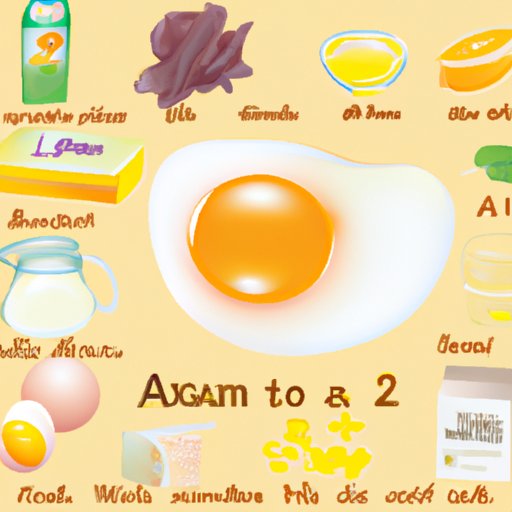Introduction
Vitamin A is a vital nutrient for overall health and well-being. It plays an important role in vision, bone growth, reproduction, cell division, and immune system functioning. It can also help protect against certain infections and diseases, including cancer, heart disease, and diabetes. While there are several ways to get enough Vitamin A in your diet, it’s important to understand how much you need and which foods are best for providing it.

Eating Foods High in Vitamin A
There are many foods that are high in Vitamin A, such as carrots, sweet potatoes, kale, spinach, and cantaloupe. Carrots are one of the best sources of Vitamin A; just one cup of raw carrots provides over 400% of the daily recommended amount of Vitamin A. Sweet potatoes are another excellent source; a single small potato contains almost 300% of the recommended daily allowance. Kale is also a great choice, with one cup providing over 200% of the daily requirement. Spinach and cantaloupe are also good sources of Vitamin A, with one cup of each providing over 100% of the daily recommended amount.

Taking a Vitamin A Supplement
If you’re unable to get enough Vitamin A from your diet, there are several types of supplements available. The most common form is retinol, a type of preformed Vitamin A found in animal sources. This type of supplement is available in both capsule and liquid form. Beta-carotene is another form of Vitamin A found in plant sources, and is available in both pill and powder form. It’s important to talk to your doctor before taking any kind of supplement, as they will be able to recommend the right dosage and type for you.
Drinking Fortified Milk or Orange Juice
Fortified milk and orange juice are two other great sources of Vitamin A. Many brands of milk are fortified with Vitamin A, so check the label to make sure you’re getting the right kind. Orange juice is also a great source of Vitamin A; one cup of orange juice provides over 30% of the daily recommended allowance. When choosing a brand of orange juice, make sure to look for one that is fortified with Vitamin A, as many brands are not.

Adding Cod Liver Oil to Your Diet
Cod liver oil is an excellent source of Vitamin A, as well as omega-3 fatty acids. It can be taken in liquid or capsule form, and should be taken with meals to increase absorption. When taking cod liver oil, it’s important to follow the directions on the bottle, as too much can lead to toxicity. Also, if you’re pregnant or nursing, it’s best to avoid cod liver oil, as it can be harmful to an unborn or nursing baby.
Incorporating Liver, Egg Yolks, and Butter into Your Meals
Organ meats, such as liver, are packed with Vitamin A. Just three ounces of beef liver provide over 700% of the daily recommended amount of Vitamin A. Egg yolks are also a good source of Vitamin A; one egg yolk contains around 10% of the daily requirement. Finally, butter is a good source of Vitamin A; one tablespoon contains about 3% of the daily recommended allowance. When using these ingredients in recipes, it’s important to keep portion sizes small to avoid overdoing it on the Vitamin A.
Conclusion
Vitamin A is an essential nutrient for overall health and well-being. There are several ways to get enough Vitamin A in your diet, including eating foods high in Vitamin A, taking a supplement, drinking fortified milk or orange juice, adding cod liver oil to your diet, and incorporating organ meats, egg yolks, and butter into your meals. With a little bit of planning and knowledge, you can easily get enough Vitamin A every day.
It’s important to talk to your doctor before taking any kind of supplement, as they will be able to recommend the right dosage and type for you. Additionally, it’s important to remember that too much Vitamin A can be toxic, so it’s important to stay within the recommended daily allowance.
By following the tips above, you can easily get enough Vitamin A in your diet and enjoy all the benefits it has to offer.


